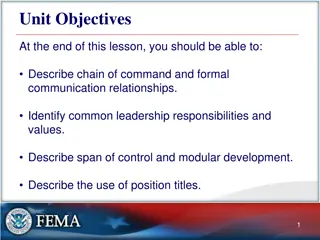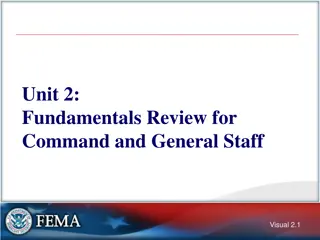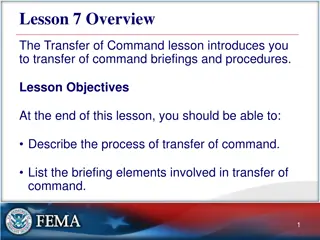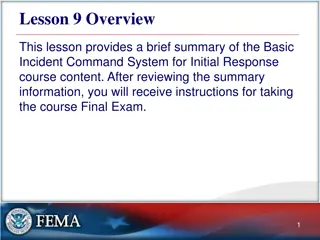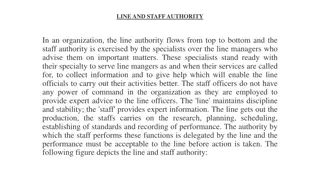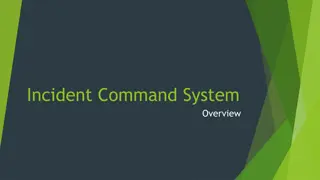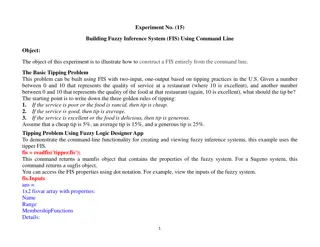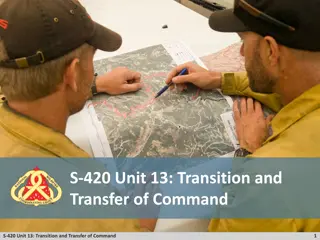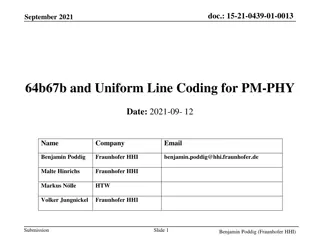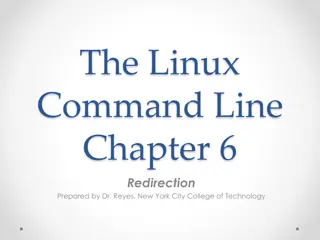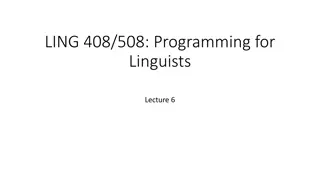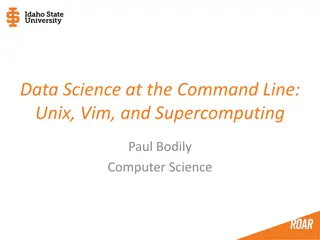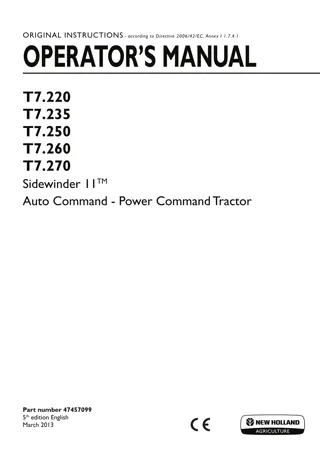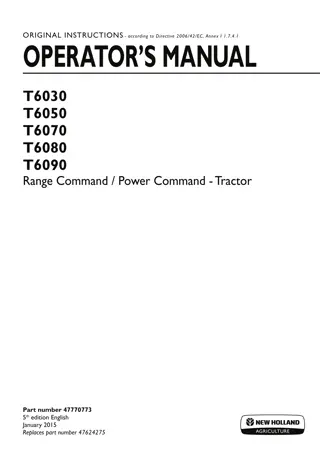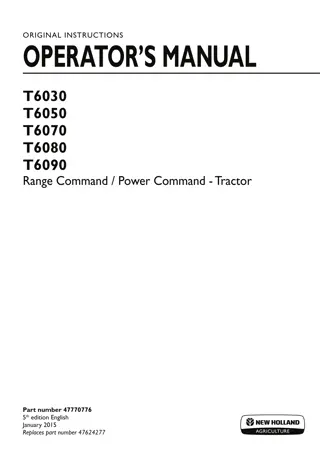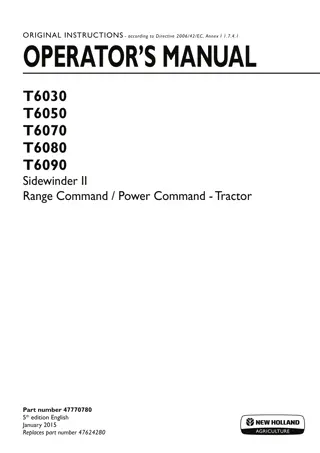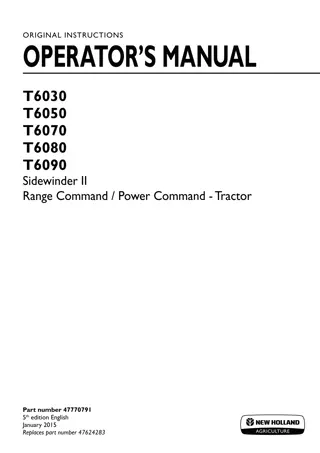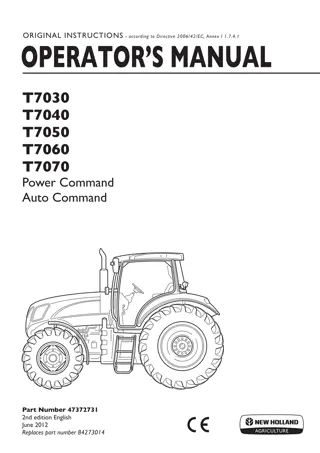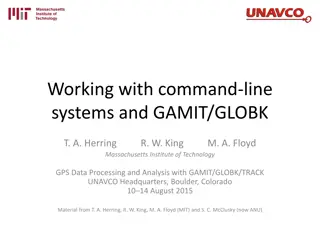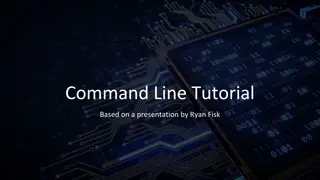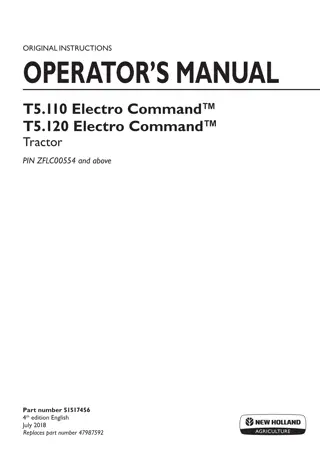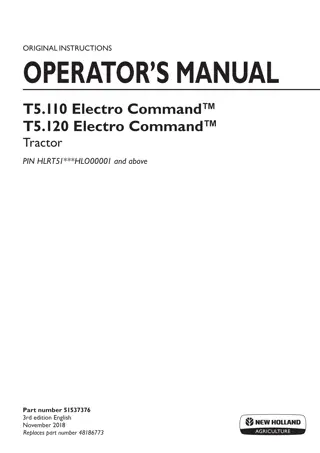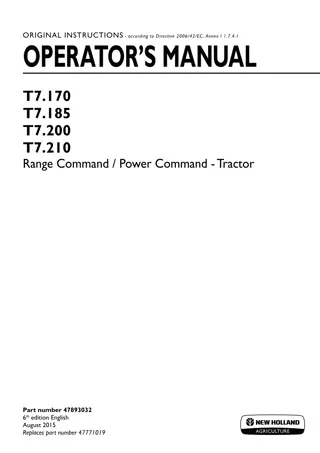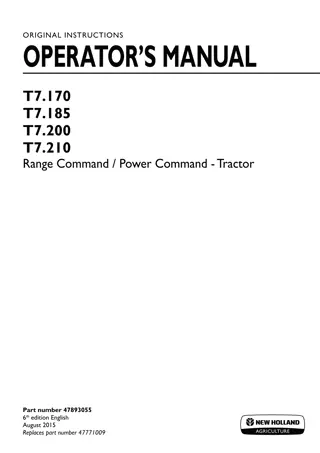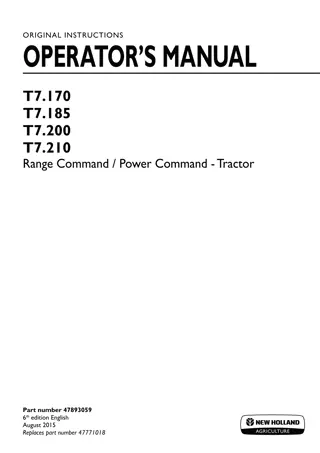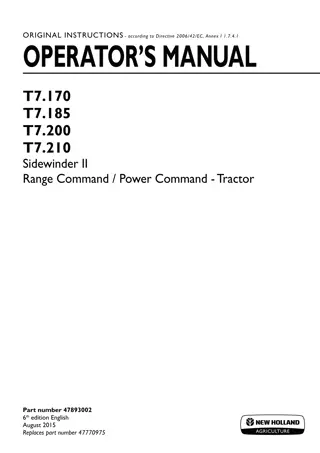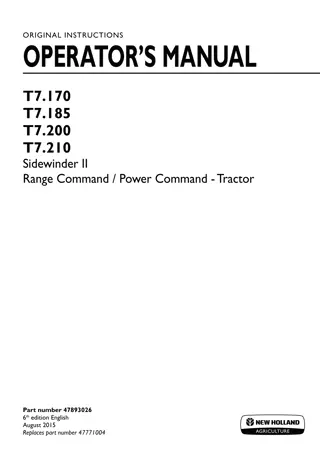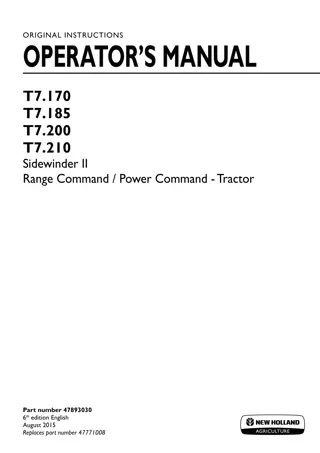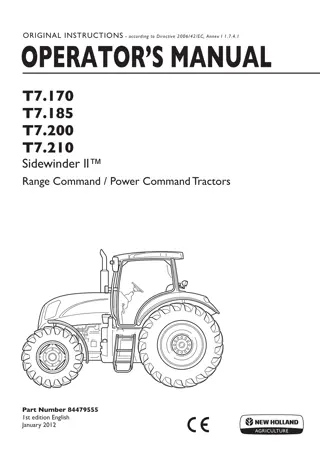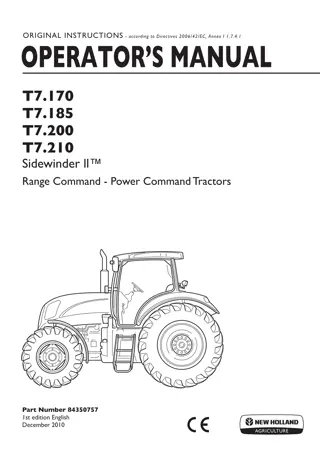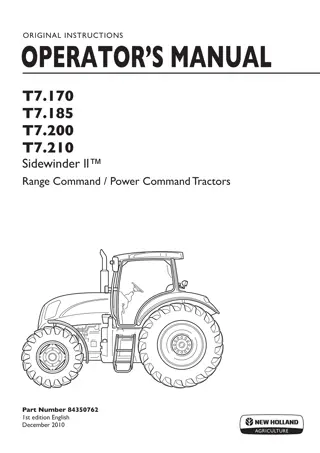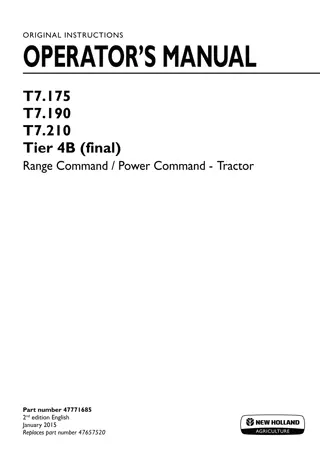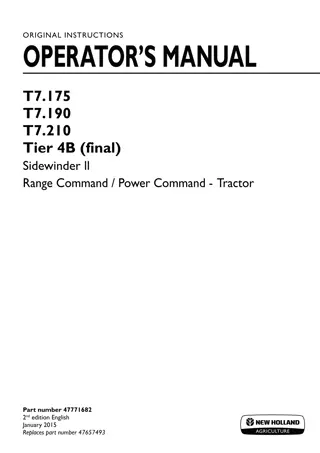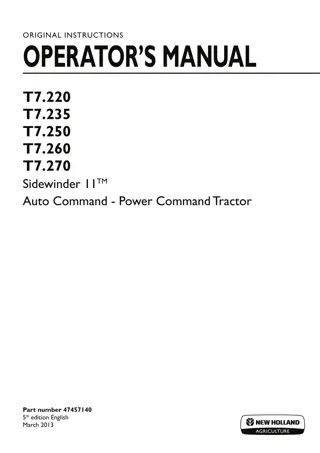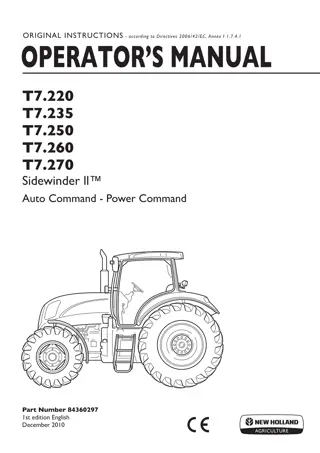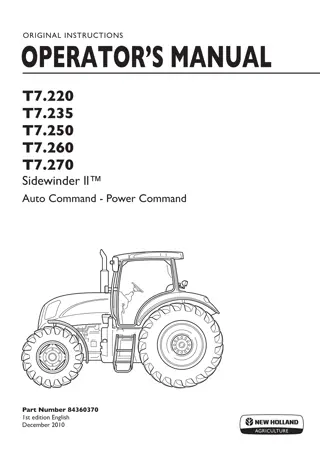Unit Objectives
Learn about the importance of chain of command, unity of command, and unified command in organizational leadership. Discover how these concepts help establish clear communication, streamline decision-making, and optimize resource management during incidents. Explore the advantages of using unified c
2 views • 35 slides
Incident Management Fundamentals and Command Structure Review
Explore key NIMS doctrine concepts, agency policies, incident complexity factors, and Unified Command functions in managing complex incidents or events. Learn about Incident Action Planning, transfer of command, and the roles of Command and General Staff positions. Gain insights into incident comple
1 views • 11 slides
Transfer of Command Procedures in Incident Management
The Transfer of Command lesson delves into the process of shifting incident command responsibilities, outlining reasons for transfer, and discussing how a more qualified individual's arrival does not always necessitate a change in command. The lesson emphasizes the importance of face-to-face transfe
3 views • 11 slides
Basic Incident Command System Overview
This lesson provides a summary of the Basic Incident Command System for Initial Response course content. It covers the NIMS framework, ICS management systems, incident command structure, unity of command, communication protocols, delegation of authority, and management by objectives. Understanding t
5 views • 15 slides
Line and Staff Authority in Organizational Structure
Line authority flows from top to bottom in an organization, while staff authority is provided by specialists to advise line managers. Staff members offer expert advice and support to enhance the efficiency of line officials. Different types of staff positions exist, such as personal staff, specializ
1 views • 5 slides
Incident Command System (ICS) Organizational Components
This lesson introduces the key components of the Incident Command System (ICS), including the Command Staff, General Staff, and essential tools. It covers the roles of the Incident Commander, Deputy Incident Commander, and Command Staff positions, emphasizing their functions in managing incidents ef
0 views • 40 slides
Overview of Incident Command System (ICS) for Emergency Response
The Incident Command System (ICS) is a model designed for effective command, control, and coordination of emergency responses at various levels. It provides a structured framework for managing incidents, ensuring unified command, setting objectives, managing resources efficiently, and maintaining cl
0 views • 18 slides
Command-line Arguments and Errors
Learn how to utilize command-line arguments in Python scripts to enhance flexibility and parametrize functions for various inputs. Explore ways to access and utilize command-line arguments effectively, while handling errors gracefully.
0 views • 30 slides
Building Fuzzy Inference System (FIS) Using Command Line: Tipping Problem Example
Illustrate constructing a FIS from the command line to solve the Basic Tipping Problem. Define rules based on service and food quality to determine tip percentage. Demonstrates creating and viewing fuzzy inference systems using a command-line approach.
0 views • 7 slides
Transition and Transfer of Incident Command
Ensuring effective transition and transfer of incident command is crucial for incident management. This involves activities such as demobilization planning, transfer of command planning, incident package creation, and more. Detailed plans need to be in place to facilitate a smooth handover of author
0 views • 12 slides
Optimizing Line Coding for PM-PHY: A Detailed Analysis
Enabling line coding and channel equalization methods for PM-PHY, the IEEE 802.15.13 standard introduces overhead while enhancing channel adaptation. This contribution proposes 64b67b and Uniform Line Coding as alternative transmission modes, aiming to reduce line coding overhead while maintaining a
0 views • 26 slides
Comprehensive Guide to Redirection, Pipelines, and Patterns in Linux Command Line
This comprehensive guide covers the use of redirection, pipelines, filters, and patterns in the Linux command line. Learn how to redirect output, use pipelines to pass output between commands, apply filters like sort and uniq, search for patterns using grep, and more. Gain a deeper understanding of
0 views • 7 slides
Introduction to Shell Arithmetic and Command.bc for Linguists
Today's lecture covers shell arithmetic, positional parameters for shell scripts, making shell scripts executable, and using command.bc for mathematical computations in the shell environment. Examples and demonstrations on shell arithmetic, utilizing the 'expr' command, and leveraging 'bc' command f
0 views • 21 slides
Data Science at the Command Line with UNIX and Vim
Delve into the world of data science through the command line, UNIX, and Vim, which offer agile, filesystem-integrated, scalable, and extensible solutions. Discover the significance of the command line, its integration with other technologies, and the role it plays in supercomputing and remote compu
0 views • 29 slides
New Holland T7.220 T7.235 T7.250 T7.260 T7.270 Sidewinder II™ Auto Command Power Command Tractor Operator’s Manual Instant Download (Publication No.47457099)
New Holland T7.220 T7.235 T7.250 T7.260 T7.270 Sidewinder II\u2122 Auto Command Power Command Tractor Operator\u2019s Manual Instant Download (Publication No.47457099)
0 views • 22 slides
New Holland T6030 T6050 T6070 T6080 T6090 Range Command Power Command Tractor Operator’s Manual Instant Download (Publication No.47770773)
New Holland T6030 T6050 T6070 T6080 T6090 Range Command Power Command Tractor Operator\u2019s Manual Instant Download (Publication No.47770773)
0 views • 21 slides
New Holland T6030 T6050 T6070 T6080 T6090 Range Command Power Command Tractor Operator’s Manual Instant Download (Publication No.47770776)
New Holland T6030 T6050 T6070 T6080 T6090 Range Command Power Command Tractor Operator\u2019s Manual Instant Download (Publication No.47770776)
0 views • 23 slides
New Holland T6030 T6050 T6070 T6080 T6090 Sidewinder II Range Command Power Command Tractor Operator’s Manual Instant Download (Publication No.47770780)
New Holland T6030 T6050 T6070 T6080 T6090 Sidewinder II Range Command Power Command Tractor Operator\u2019s Manual Instant Download (Publication No.47770780)
0 views • 22 slides
New Holland T6030 T6050 T6070 T6080 T6090 Sidewinder II Range Command Power Command Tractor Operator’s Manual Instant Download (Publication No.47770791)
New Holland T6030 T6050 T6070 T6080 T6090 Sidewinder II Range Command Power Command Tractor Operator\u2019s Manual Instant Download (Publication No.47770791)
0 views • 22 slides
New Holland T7030 T7040 T7050 T7060 T7070 Power Command Auto Command Tractors Operator’s Manual Instant Download (Publication No.47372731)
New Holland T7030 T7040 T7050 T7060 T7070 Power Command Auto Command Tractors Operator\u2019s Manual Instant Download (Publication No.47372731)
0 views • 23 slides
Working with command-line systems and GAMIT/GLOBK
This content provides valuable insights into working with command-line systems and GPS data processing using GAMIT/GLOBK software. It covers topics such as environment variables, everyday command line operations, powerful utilities like awk and grep, as well as practical examples and techniques for
0 views • 41 slides
Command Line Tutorial
The fundamentals of working with the command line interface, from navigating directories to creating and running code files. Learn how to make new folders, list files in a directory, compile and run code using Java, and more. Take on practical exercises to enhance your understanding and become famil
0 views • 15 slides
Demystifying the Command Line for Digital Scholarship
Command line, the shell/terminal, basic syntax, and more in this guide to demystifying digital scholarship. Learn what the command line is, how to use it for efficient computing, and why it's essential for various tasks like text editing, file management, and accessing computers remotely. Understand
0 views • 24 slides
New Holland T5.110 Electro Command™ T5.120 Electro Command™ Tractor (Pin.ZFLC00554 and above) Operator’s Manual Instant Download (Publication No.51517456)
New Holland T5.110 Electro Command\u2122 T5.120 Electro Command\u2122 Tractor (Pin.ZFLC00554 and above) Operator\u2019s Manual Instant Download (Publication No.51517456)
0 views • 22 slides
New Holland T5.110 Electro Command™T5.120 Electro Command™ Tractor (Pin.HLRT51HLO00001 and above) Operator’s Manual Instant Download (Publication No.51537376)
New Holland T5.110 Electro Command\u2122T5.120 Electro Command\u2122 Tractor (Pin.HLRT51HLO00001 and above) Operator\u2019s Manual Instant Download (Publication No.51537376)
0 views • 22 slides
New Holland T7.170 T7.185 T7.200 T7.210 Range Command Power Command Tractor Operator’s Manual Instant Download (Publication No.47893032)
New Holland T7.170 T7.185 T7.200 T7.210 Range Command Power Command Tractor Operator\u2019s Manual Instant Download (Publication No.47893032)
0 views • 22 slides
New Holland T7.170 T7.185 T7.200 T7.210 Range Command Power Command Tractor Operator’s Manual Instant Download (Publication No.47893055)
New Holland T7.170 T7.185 T7.200 T7.210 Range Command Power Command Tractor Operator\u2019s Manual Instant Download (Publication No.47893055)
0 views • 22 slides
New Holland T7.170 T7.185 T7.200 T7.210 Range Command Power Command Tractor Operator’s Manual Instant Download (Publication No.47893059)
New Holland T7.170 T7.185 T7.200 T7.210 Range Command Power Command Tractor Operator\u2019s Manual Instant Download (Publication No.47893059)
0 views • 22 slides
New Holland T7.170 T7.185 T7.200 T7.210 Sidewinder II Range Command Power Command Tractor Operator’s Manual Instant Download (Publication No.47893002)
New Holland T7.170 T7.185 T7.200 T7.210 Sidewinder II Range Command Power Command Tractor Operator\u2019s Manual Instant Download (Publication No.47893002)
0 views • 22 slides
New Holland T7.170 T7.185 T7.200 T7.210 Sidewinder II Range Command Power Command Tractor Operator’s Manual Instant Download (Publication No.47893026)
New Holland T7.170 T7.185 T7.200 T7.210 Sidewinder II Range Command Power Command Tractor Operator\u2019s Manual Instant Download (Publication No.47893026)
0 views • 22 slides
New Holland T7.170 T7.185 T7.200 T7.210 Sidewinder II Range Command Power Command Tractor Operator’s Manual Instant Download (Publication No.47893030)
New Holland T7.170 T7.185 T7.200 T7.210 Sidewinder II Range Command Power Command Tractor Operator\u2019s Manual Instant Download (Publication No.47893030)
0 views • 22 slides
New Holland T7.170 T7.185 T7.200 T7.210 Sidewinder II™ Range Command Power Command Tractors Operator’s Manual Instant Download (Publication No.84479555)
New Holland T7.170 T7.185 T7.200 T7.210 Sidewinder II\u2122 Range Command Power Command Tractors Operator\u2019s Manual Instant Download (Publication No.84479555)
0 views • 22 slides
New Holland T7.170 T7.185 T7.200 T7.210 Sidewinder II™ Range Command Power Command Tractors Operator’s Manual Instant Download (Publication No.84350757)
New Holland T7.170 T7.185 T7.200 T7.210 Sidewinder II\u2122 Range Command Power Command Tractors Operator\u2019s Manual Instant Download (Publication No.84350757)
0 views • 22 slides
New Holland T7.170 T7.185 T7.200 T7.210 Sidewinder II™ Range Command Power Command Tractors Operator’s Manual Instant Download (Publication No.84350762)
New Holland T7.170 T7.185 T7.200 T7.210 Sidewinder II\u2122 Range Command Power Command Tractors Operator\u2019s Manual Instant Download (Publication No.84350762)
0 views • 22 slides
New Holland T7.175 T7.190 T7.210 Tier4B (final) Range Command Power Command Tractor Operator’s Manual Instant Download (Publication No.47771685)
New Holland T7.175 T7.190 T7.210 Tier4B (final) Range Command Power Command Tractor Operator\u2019s Manual Instant Download (Publication No.47771685)
0 views • 22 slides
New Holland T7.175 T7.190 T7.210 Tier4B (final) Sidewinder II Range Command Power Command Tractor Operator’s Manual Instant Download (Publication No.47771682)
New Holland T7.175 T7.190 T7.210 Tier4B (final) Sidewinder II Range Command Power Command Tractor Operator\u2019s Manual Instant Download (Publication No.47771682)
0 views • 22 slides
New Holland T7.220 T7.235 T7.250 T7.260 T7.270 Sidewinder II™ Auto Command Power Command Tractor Operator’s Manual Instant Download (Publication No.47457099)
New Holland T7.220 T7.235 T7.250 T7.260 T7.270 Sidewinder II\u2122 Auto Command Power Command Tractor Operator\u2019s Manual Instant Download (Publication No.47457099)
0 views • 22 slides
New Holland T7.220 T7.235 T7.250 T7.260 T7.270 Sidewinder II™ Auto Command Power Command Tractor Operator’s Manual Instant Download (Publication No.47457140)
New Holland T7.220 T7.235 T7.250 T7.260 T7.270 Sidewinder II\u2122 Auto Command Power Command Tractor Operator\u2019s Manual Instant Download (Publication No.47457140)
0 views • 22 slides
New Holland T7.220 T7.235 T7.250 T7.260 T7.270 Sidewinder II™ Auto Command Power Command Tractors Operator’s Manual Instant Download (Publication No.84360297)
New Holland T7.220 T7.235 T7.250 T7.260 T7.270 Sidewinder II\u2122 Auto Command Power Command Tractors Operator\u2019s Manual Instant Download (Publication No.84360297)
0 views • 22 slides
New Holland T7.220 T7.235 T7.250 T7.260 T7.270 Sidewinder II™ Auto Command Power Command Tractors Operator’s Manual Instant Download (Publication No.84360370)
New Holland T7.220 T7.235 T7.250 T7.260 T7.270 Sidewinder II\u2122 Auto Command Power Command Tractors Operator\u2019s Manual Instant Download (Publication No.84360370)
0 views • 22 slides
